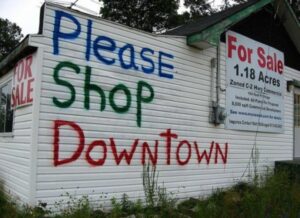Get Out of Town! Are you Being “Localwashed” by Corporate Giants?

When concerns about climate change and its impact on the environment started to garner mainstream attention, corporations jumped on the “earth-friendly” bandwagon, many accused of “greenwashing”—making claims that were less beneficial to the environment, but incredibly beneficial to profits. Now, as interest in supporting local economies gains momentum across the country, corporate “localwashing” has begun to appear.
A recent issue of Utne Reader featured an article (reprinted from Gambit Weekly in 2009) on the issue of localwashing, citing companies that have taken to using the “local” angle such as HSBC—one of the world’s largest banks— the ubiquitous coffee-chain, Starbucks, along with Winn-Dixie, a 500-outlet supermarket chain found throughout the southern U.S. Chipotle sources more than 10 million pounds of produce from within 350 miles of each of its 1,300 U.S. location.
Companies have often tailored their brand of franchises to local palates (McDonald’s just opened its first vegetarian location in Amritsar, India, for example). But “local” tends to mean something different for consumers. They want it to mean locally owned and operated, without tethers to corporate offices somewhere across the country or the planet. They want it to mean “unique” as much as it means “small business.” In the latest issue of Consumer Reports, the organization cites a poll conducted by the Consumer Reports National Research Center that shows 78 percent of Americans would buy a U.S. made product over the same product made in another country. And, those polled said they would also be willing to pay more money to keep the product “local.”
One of the biggest and most important sectors of the “buy local” movement is food—and demand is growing rapidly. Nearly 8,000 farmers markets are now active in the U.S. versus less than half that many fewer than five years ago. And while there’s a good chance that virtually every product purchased at a community farmers market is locally produced, the same can’t be said for items found in supermarkets bearing similar branding distinctions. Whole Foods Market—the leading chain of organic and natural-focused food, household and personal care items—has loose terms when it comes to “local.” In most cases, it’s no more than one day’s drive away. Not exactly down the street.
Wal-mart, the nation’s largest supermarket chain, highlights its local growers and producers on its website, but the company claims any food is “local” if it’s grown within the state. (To drive from one end of California to the other takes more than 13 hours; Texas is about 11.)
Like “natural” or “green” there are no regulations for the term “local.” Multinational corporations are invested in getting your local business and will get better at telling you what you want to hear in order to take that dollar instead of letting it go to a truly local seller, who surely needs it more, and will most likely also keep it local when spending it.
So, how do you tell if something really is local? Start by weeding out the obvious big box chain stores—no matter how they try to lure you. Visit a local farmers market or join a CSA program for your fruits and vegetables. Join a local credit union instead of a corporate bank. Talk with local restaurateurs and bakeries to see if they source ingredients from nearby farms. Join a food swap. Avoid malls and shop the independent business instead. Check out thrift stores for the rest—they’re usually tied with a local charity as well. Start investing your time in learning how to make some of the items you’d normally buy from a big retailer—that’s the ultimate in not only staying local, but committing to be part of the process in a most important way.
Keep in touch with Jill on Twitter @jillettinger
Resources:
http://www.consumerreports.org/cro/magazine/2013/02/made-in-america/index.htm
http://www.triplepundit.com/2012/09/walmart-local-produce/
http://www.wholefoodsmarket.com/locally-grown
Image:Peter Blanchard

